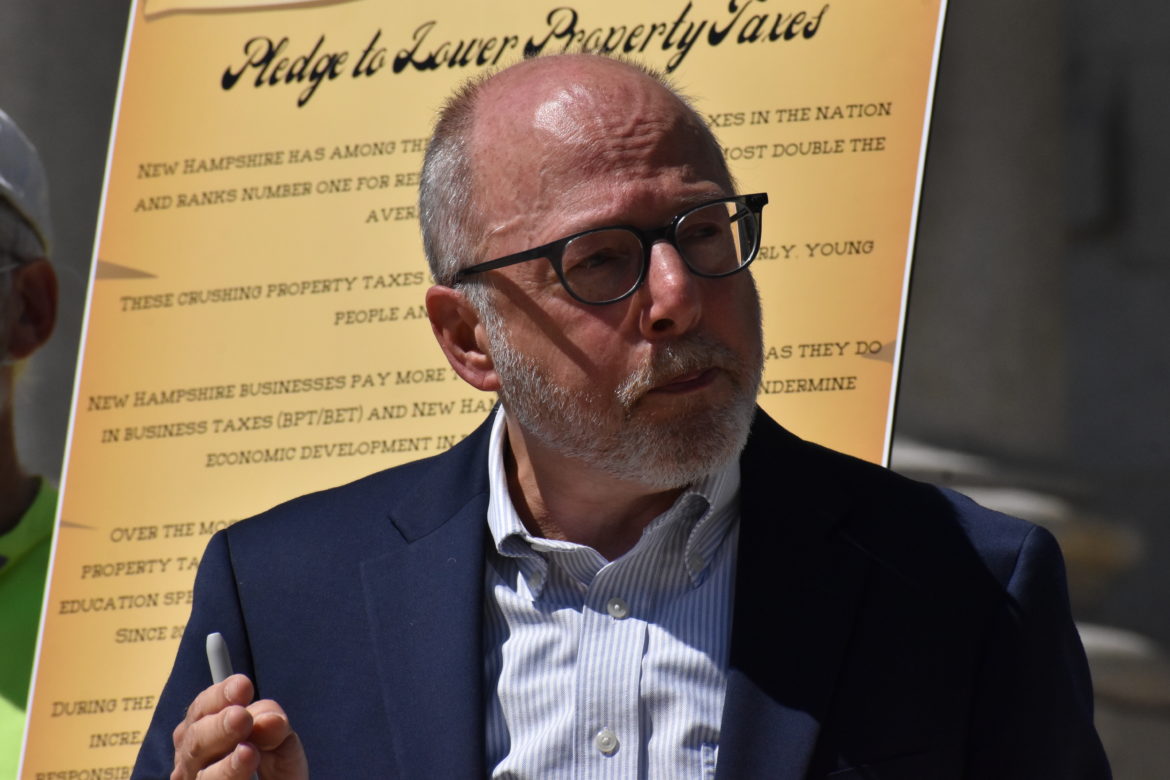From ‘A Book, an Idea and a Goat,’ Andru Volinsky’s weekly newsletter on Substack is primarily devoted to writing about the national movement for fair school funding and other means of effecting social change. Here’s the link: https://substack.com/@andruvolinsky?utm_source=profile-page
By ANDRU VOLINSKY
My wife, Amy, was polled the other day. She’s a registered Independent voter who doesn’t miss an election and she is often called to answer poll questions. One of the questions asked of her really struck me.
Are you concerned about displaying a Harris/Walz political sign on your lawn?
The question makes sense. It will provide a measure of the current Zeitgeist. But what are we to say about our society when fear of reprisal is so prevalent that it undermines our political expression?
I turned the question around in my head and wondered how it relates to the questions I ask when I see Trump signs. The first one is: “Really?”
Then I ask myself: Does that person think Trump will help him economically if elected? Is she really that afraid of immigrants in our most northern state of New Hampshire? They are an active church-going family and the husband with whom I am friends is the gentlest soul you can imagine. Do they support the person who Trump is?
Most importantly, I ask: How do I engage these folks? How do I reason with them?
The answer doesn’t lie in mailers or political yard signs. It may not be possible to even talk to them in a meaningful way during one election cycle. Their vote may be lost this November and there is nothing to be done about that. But I think beyond this November. What can be done to lay a foundation to begin communicating?
On one level, the answer is not exciting or extravagant. The answer is to engage broadly, regularly and respectfully. By this, I don’t mean engage politically or through political parties. I mean engage informally and formally. Join organized groups if you are so inclined but also walk in your neighborhood. Help your neighbors. Share work and share joy. Be informed about what is going on around you and don’t be afraid to start conversations in the gym, at the grocery store, at your kid’s school. Don’t treat others as if they’re stupid or deplorable. If you need help, ask for it. If they need help, offer it.
On another level, those who aspire to lead must take positions and some risks. It is always risky to propose solutions. Your proposals may be rejected. Your solutions might not work. You may be blamed for all manner of things. If you care about making change, however, the risk is worth it.
School Funding Update
The Rand trial begins September 30th before Judge David Ruoff in the Rockingham County Superior Court located in Brentwood, NH on Rte 125 just a few miles south of Rte 101. The trial is public. Court days will generally be 10-4. The state is represented by three or four attorneys general and the Stinson Law Firm from St. Louis. Stinson, which has been paid in excess of one million dollars in fees, has a national practice defending inequitable school funding systems. (There’s a sure way to get to heaven!). We’ve seen at least four of their lawyers on the Rand case.
John Tobin, Natalie Laflamme and I represent the Rand plaintiffs. We have the pro bono assistance of a team of lawyers from White and Case in New York. We also have policy assistance from the Education Law Center.
I thought I’d share a summary of the case from the pretrial memo we filed this week to preview the case for Judge Ruoff. Lots of lawyers from our team contributed to the pretrial brief but the writing was led by Alice Tseir, Kim King and Michael Jaoude.
“The Constitution requires the State to provide an adequate education. All parties agree that this means that the State must (i) define an adequate education, (ii) determine the cost, (iii) fund it with constitutional taxes, and (iv) ensure its delivery through accountability. . .Plaintiffs have alleged that the money the State provides for the funding of adequacy is not nearly enough to cover the cost of delivering an adequate education, even under the State’s own definition of an adequate education. As a result, districts must rely on local school taxes to bridge the gap. Because districts have very different abilities to raise funds, local education tax rates are unequal across the state. Accordingly, the reliance on these local taxes to pay for adequacy violates Part II, Article 5 of the New Hampshire Constitution which requires state taxes to be uniform in rate.
Plaintiffs all own real property in New Hampshire and pay local school property taxes to fund public education. As a consequence, the State’s unconstitutional funding system violates Plaintiffs’ rights under Part II, Article 5.”
Our brief to the NH Supreme Court in the state’s appeal of the ruling that the Statewide Education Tax (SWEPT) is unconstitutional is due soon, as is the ConVal brief supporting Judge Ruoff’s ruling that the amount of base adequacy is too low. Friend of the Court (amicus) briefs will also soon be filed in both cases.
More updates in the next few Substack postings. Stay tuned.
Finally, the Joint Legislative Committee on Administrative Rules (JLCAR), which must approve all amendments to state regulations, decided to delay consideration of the amendments to the state’s minimum standards (also known as 306s). The NH Department of Education proposed amending half the rules and submitting them for consideration now and then coming back later for the second half of the amendments. The joint committee asked for the entire set of amendments to be considered at once. The next possible date for consideration is in November.





